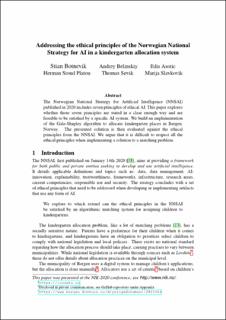| dc.contributor.author | Botnevik, Stian | |
| dc.contributor.author | Belinskiy, Andrey | |
| dc.contributor.author | Asotic, Edis | |
| dc.contributor.author | Platou, Herman Stoud | |
| dc.contributor.author | Søvik, Thomas | |
| dc.contributor.author | Slavkovik, Marija | |
| dc.date.accessioned | 2021-07-13T07:51:16Z | |
| dc.date.available | 2021-07-13T07:51:16Z | |
| dc.date.created | 2020-12-15T11:41:09Z | |
| dc.date.issued | 2020 | |
| dc.identifier.isbn | 978-3-540-68164-9 | |
| dc.identifier.issn | 1892-0713 | |
| dc.identifier.uri | https://hdl.handle.net/11250/2764228 | |
| dc.description.abstract | The Norwegian National Strategy for Artificial Intelligence (NNSAI) published in 2020 includes seven principles of ethical AI. This paper explores whether those seven principles are stated in a clear enough way and are feasible to be satisfied by a specific AI system. We build an implementation of the Gale-Shapley algorithm to allocate kindergarten places in Bergen, Norway. The presented solution is then evaluated against the ethical principles from the NNSAI. We argue that it is difficult to respect all the ethical principles when implementing a solution to a matching problem. | en_US |
| dc.language.iso | eng | en_US |
| dc.publisher | Norsk IKT-konferanse for forskning og utdanning | en_US |
| dc.relation.ispartof | NIKT: Norsk IKT-konferanse for forskning og utdanning 2020 | |
| dc.title | Addressing the ethical principles of the Norwegian National Strategy for AI in a kindergarten allocation system | en_US |
| dc.type | Chapter | en_US |
| dc.description.version | publishedVersion | en_US |
| cristin.ispublished | true | |
| cristin.fulltext | original | |
| dc.identifier.cristin | 1859951 | |
| dc.identifier.citation | NIK Norsk informatikkonferanse. 2020, 1. | en_US |
